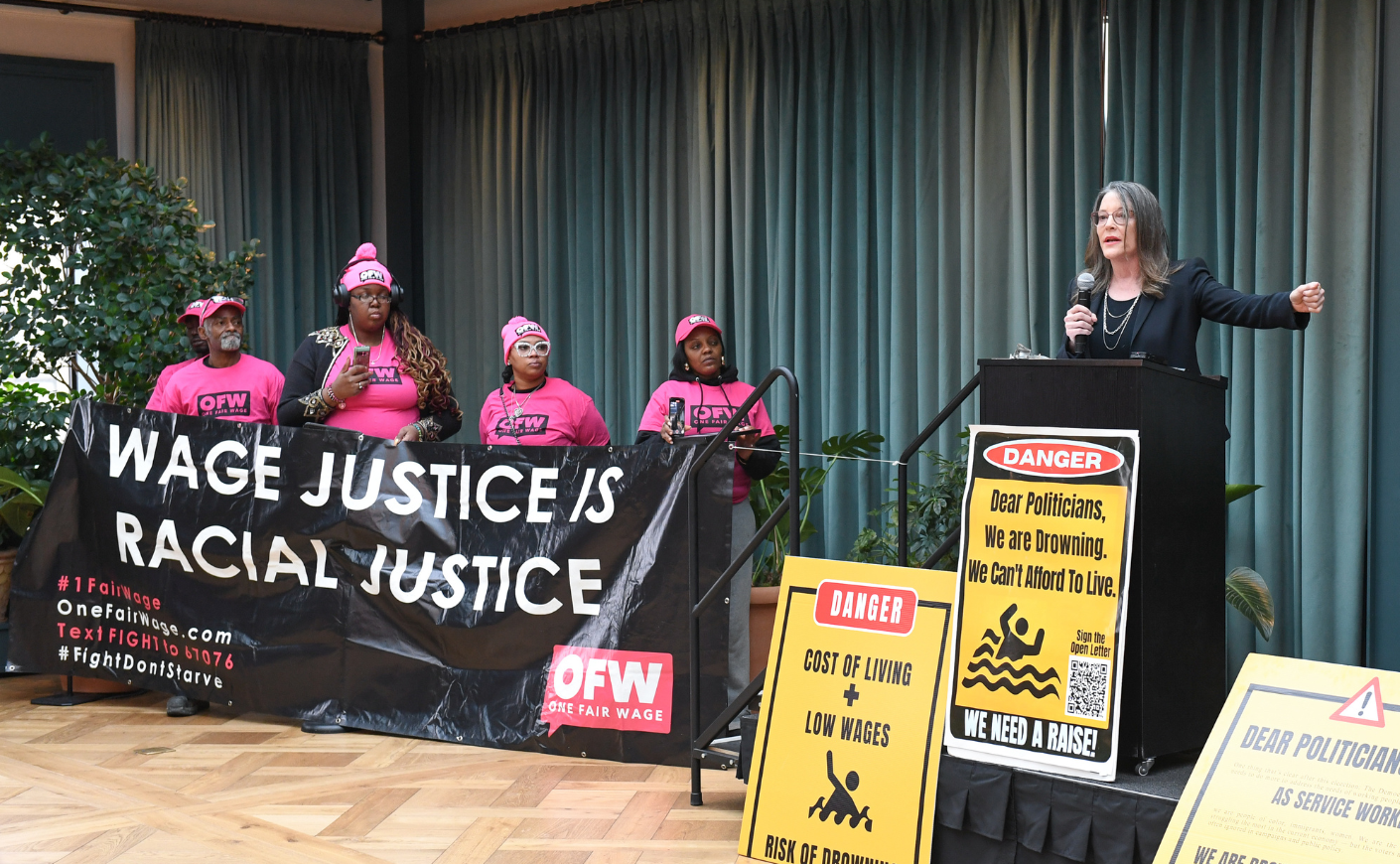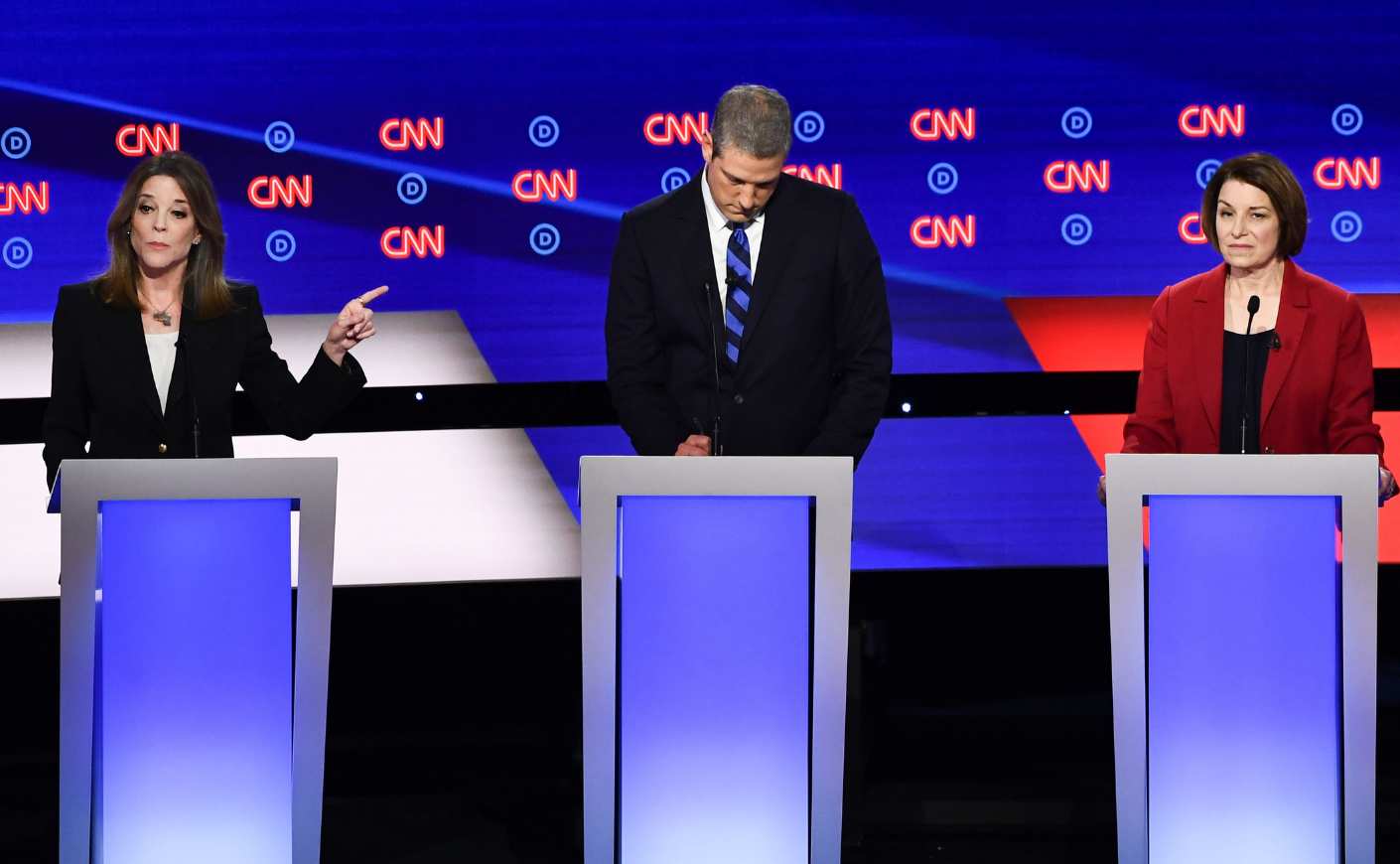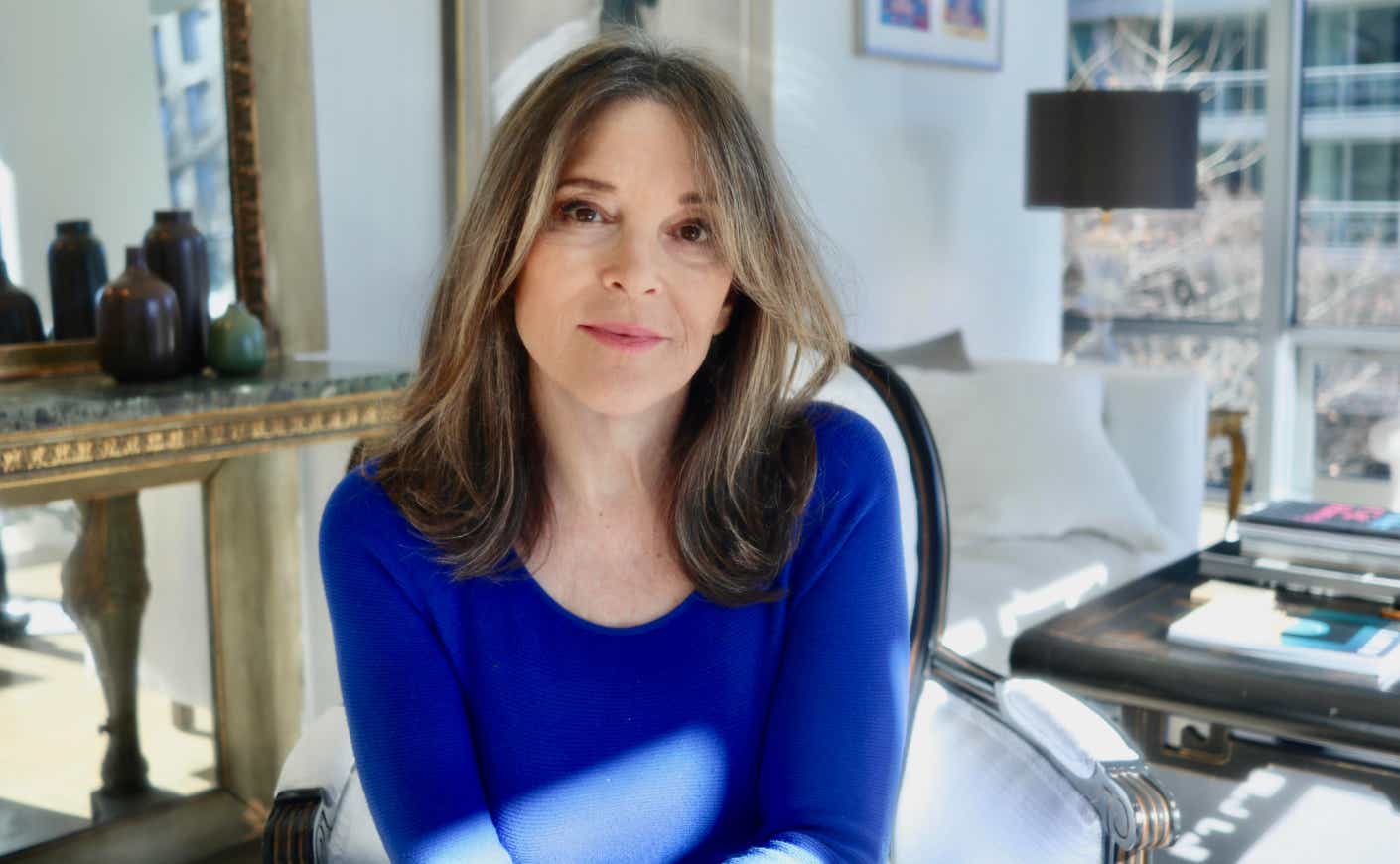Democrats are still reeling from President Donald Trump’s return to the White House. With his flurry of executive orders and pardons, the 45th-turned-47th commander-in-chief’s new administration is taking shape at lightning speed, leaving the left scrambling for a cohesive response.
Kamala Harris's 2024 defeat has triggered a wave of finger-pointing within Democratic ranks. Senator Bernie Sanders accused the party of abandoning working-class people and depending too heavily on affluent donors. Former House Speaker Nancy Pelosi, on the other hand, blamed the party’s latest electoral loss on former President Joe Biden’s delayed decision to exit the presidential race.
Amid the internal discord, author and two-time presidential candidate Marianne Williamson is calling for bold action. As a candidate for Democratic National Committee chair, she has pledged to “reinvent the party from the inside out.”
Williamson joins a crowded race to succeed outgoing chair Jaime Harrison, including former Maryland Gov. Martin O’Malley, Minnesota Democratic-Farmer-Labor Party Chair Ken Martin, Wisconsin Democratic Party Chair Ben Wikler, and New York State Senator James Skoufis.
On Feb. 1, DNC members will meet for their winter session to vote on a new chair and other leadership positions. In the days leading up to the election, candidates for DNC chair will take part in four forums, where they will present their visions for the future of the Democratic Party to members.
As she prepares to make her pitch to fellow Democrats, we sat down with Williamson to discuss her vision for the DNC, why she believes she’s the leader Democrats need right now, and how the party can rise to match Trump’s “audacity.” Watch our conversation in the video below, or read on for highlights.
Katie Couric Media: First, I wanted to get your thoughts on Trump's inauguration. Did you watch it?
Marianne Williamson: I did watch it. I'm not a Republican. I am not a Trump supporter. But the people have spoken, and the peaceful, democratic transition of power is essential, and I respect that.
It was not a happy inaugural ceremony. There was almost a strangeness in the air. And for those of us who are Democrats, I think many people have felt some anger at what we have felt was a dereliction of political responsibility on the part of the Democratic establishment in ways that made this result possible. But that was then, and this is now. It wasn't the inauguration itself so much as the executive orders that came later in the day that solidified what, in ways, are my worst fears.
We expected him to launch a shock-and-awe campaign, and he fulfilled those expectations. He is the president of the United States, and I respect that. But when his policy positions go against what we believe are Democratic values, American values, or just human values, then I think it's incumbent upon us to stand up, show up, and, where necessary — in a political and appropriate way — push back.
Which of Trump's executive orders do you consider most concerning?
With the stroke of his pen, many lives were thrown into havoc. For instance, [Trump’s] call for an emergency at the border. Any American, left or right — well, most of us — surely you want to deport violent criminals. Most of us would say “go for it.” But this delineation is very unclear because what do they mean by “criminals”? Would that mean just somebody who has a traffic violation?
We also have thousands of miles of a border on the south and on the north. Where is he planning to send all of these military personnel? The average American might not realize that there are places on our border with Mexico, for instance, where people constantly move between places. They live in one place and work in another, like in El Paso and Juarez. And in Afghanistan, people were already set to get on the planes in order to come over here, who are otherwise in danger of Taliban retribution, and all of a sudden they cannot.
How could any American of goodwill, Republican or Democrat, not be deeply concerned?
As you know, Trump's return to the White House follows a contentious election. With a largely GOP-controlled Congress, do you think Democrats should coexist or resist? Or is there a way they can strike a balance?
With your values, you must never compromise with politics. However, politics is the art of compromise. So, in terms of congressional behavior, we should work with the president where we can. And what matters here is the well-being of the American people. So if I were a Democratic legislator, for instance, absolutely — if the president is doing something we can work with and negotiate and come up with a good deal for the American people, then, of course, we want to try to do that in general.
What do you think the Democratic Party needs to change right now?
As Democrats, we have to deal with the fact that the brand itself has been so soured, and I believe that’s because we have strayed from our more traditional Democratic values of unequivocal advocacy for the working people of the United States. Roosevelt's coattails have worn out. The younger generation, in their institutional memory, lacks significant experiences of Democrats doing noticeably more for them than Republicans.They are seeing environmental crises and economic crises that my generation didn't have to face when we were growing up.
The anger and despair are palpable. And the Democratic Party has not adequately addressed the economic and social anxiety of the majority of the American people, either in messaging and attitude or in policy. Democrats have vastly underestimated the level of pain that's out there. Even worse than that, even worse than the fact that they haven't addressed it on the level of policy, they haven't even addressed it on the level of conversation. It was very off-putting to many people in the United States when the messaging was a politics of joy.
That single mother working at Walmart, struggling to feed her children, is not feeling very joyful today. People want to feel that their pain is understood, that they are seen, that they are heard. Donald Trump has a very shrewd, almost genius capacity to act as though he cares. And every once in a while, to do things with such audacity. We have to match his level of audacity.

As you mentioned, many factors contributed to the Democrats' defeat. In your view, what was the most significant reason for the party's loss in 2024?
The main reason the party lost was that the party decided that we just wouldn't have a primary. The Republicans had a primary, they had debates, they had CNN town halls. So for a year and a half, they were having this robust conversation. Everybody was looking at them.
The Democratic electorate should have been exposed to all of the options. And yes, I can tell you, in my case, I absolutely would have heard an agenda far more emphatic about our need to address the needs of the working people of the United States.
But it’s not uncommon for incumbent presidents to face little to no opposition from their own party when running for a second term.
We don't primary a sitting president? Says who? That's just a concocted narrative. No one primaried [President Bill] Clinton and President Obama because they succeeded. But that was not the case with Biden — if you looked at the polls, we knew very early we were going to have a problem here.
[Biden] was not primaried because people were intimidated. This is exactly what George Washington warned us against. He said the political parties could become factions of men more concerned about their party than their country. Thomas Jefferson said the only safe repository for power in the United States is in the hands of the people. The appropriate and traditional role of the party is to stand back and let the people decide.
Some people say, "Well, Marianne, if you have such criticism of the Democratic Party, why would you run for the DNC?" First of all, I've been a Democrat all my life. And number two, we don't have time for the Democratic Party to fail.
Speaking of your candidacy for DNC chair, it has been called a "long-shot bid" by some media outlets, with others within the party dismissing it entirely. What's your response to that?
What the establishment does is it creates narratives, like "long-shot candidate" [and] "self-help author." These are purposeful techniques with which to demean or mock a person — and in this case, my candidacy.
I have run for president twice, so to say that I don't know anything about how the DNC operates is kind of preposterous. I know a lot. In some ways, I know more about the DNC's operating practices than average members do, but it's a very opaque organization. We talk about how people who vote for Trump are in a cult. There's a cult-like thinking among the Democrats, too.
The risk for the Democratic Party today lies in not changing. And yet there is an entire establishment built on the notion that we need to continue doing what we're doing, but do it better. They're actually telling themselves things like, "Well, we didn't lose by that much." No, actually, we did. If you talk to anyone who does transformation in terms of big companies, you bring in a consultant or an outsider. You bring in someone who has fresh perspectives because the old perspective isn't doing it.

Are you still hopeful about the future of the Democratic Party?
My hope is for my country. There are members [of the Democratic Party] who, in their hearts, know something's got to change. Democrats used to be freethinkers and tied to critical thought. But [there's this perception] that we can't deviate from the playbook. Well, I am saying, "Throw out that playbook."
There are so many loving, wonderful people out there. We could harness all that and change the world. And the Democratic Party should be a container for people's deepest yearnings. So the people could feel like if [they] participated with Democrats, they could help bring forth a wave of massive improvement in people's lives. That's what the Democratic Party needs to be, and I believe I could help make it happen.
With Trump returning to office, there's a lot of uncertainty right now. What keeps you grounded?
My own faith and belief in the goodness of people. Throughout my 40-year career, I have learned that the American people are not the problem. We're decent. We're intelligent. We're good. I'm not saying we're better than anybody else, but we're not worse, either.
This interview has been edited and condensed for clarity and length.









